
How Notion unlocked customer intelligence to generate 30% more meetings per rep per month
“The results speak for themselves. Common Room helps us reach the right people with the right message at the right time—faster and easier."

Erica Anderson
CRO
Business model
- Product-led
- Sales-led
- Enterprise
Teams
- SDRs
- BDRs
- AEs
- AMs
- CSMs
- RevOps
Use cases
- Unified customer view
- Lead and account scoring
- Product activity tracking
- Website activity tracking
- Job-change tracking
- GTM workbench
Key signals
- Summary
- Key quotes
- Background
- Consolidate GTM-unfriendly tech stack
- Transform disparate data into context-rich profiles
- Automate winning plays across teams
- Results
Turn buyer intelligence into pipeline with AI.
Get startedSummary
How Notion runs go-to-market intelligentlyAbout Notion
Notion is an AI-powered connected workspace used by millions of customers around the world, from next-generation startups to established enterprises.
Problem
Notion wanted to help go-to-market team members quickly visualize and analyze product usage data alongside other buying signals in their books of business. But team members had to switch between as many as six tools to find the user, contact, and account information they needed to research and prioritize who to reach out to—all before crafting outreach. Manual, time-consuming processes and constant context switching led to lost efficiency and productivity.
Solution
Notion replaced multiple point solutions with Common Room, enabling GTM teams to easily capture every digital signal in one place, automatically connect anonymous activity to real people and accounts, and quickly take action on buyer activity using AI and automations.
Strategy
Notion uses digital signal capture and unified identity and account intelligence to power real-time alerts for regional teams’ books of business, create interactive burndown lists for product power users, pricing page activity, job-change tracking, and other revenue plays, and automate winning strategies in the form of templatized plays for GTM teams at large.
Results
Common Room generated:
- 30% increase in meetings booked per rep per month
- 16% of total pipeline
- 18% of total revenue
Key quotes

"Common Room has consolidated our prospecting stack and streamlined our sales prospecting motion. What once took hours and multiple tools to gather—product usage, job changes, social interactions—is now immediately available. Most importantly, it's helping us generate more pipeline!"

Pratyusha Ram
GTM Systems

“Common Room is the future of connecting with your customers. My global CS team can instantly click into an account, view a complete profile of every user, and get total visibility into their behaviors across channels. We can quickly build, execute, and iterate on scaled engagement plays targeting the right people at the right time.”

Monica Perez
Head of Customer Success

“The phrase that keeps coming up from reps is ‘game changer.’ One of my SDRs says Common Room saves him 5x time, which is just huge for us.”

Aiden Blake
Head of Inside Sales, EMEA
Background
Product usage isn’t customer intelligence. It’s one buying signal among many—and it often keeps go-to-market teams bogged down in static dashboards instead of building stronger relationships with prospects and customers.
That’s why data-driven organizations like Notion are reimagining GTM by transforming product data into actionable insights—automatically and at scale—using the full spectrum of the modern customer journey.
Here’s how Notion used Common Room to:
- Eliminate manual, time-consuming processes
- Boost productivity with repeatable sales plays
- Generate 16% of total pipeline and 18% of total revenue
Consolidate GTM-unfriendly tech stack
As a long-time leader in product-led growth, Notion’s GTM organization—from pre-sales to post-sales—is built around regional teams’ ability to acquire, expand, and retain customers using product usage data.
But doing this quickly and scalably was a challenge. Teams were spending too much time hopping between different tools and manually updating customer information. It wasn’t uncommon for SDRs to spend hours collating contact info in one tool and cross-checking it in another before inputting it into a CRM.
In fact, an internal survey found that a majority of reps said prospecting was too difficult due to too many tools. Meanwhile, accessing buying signals outside of the product necessitated yet more tools and manual processes.
Notion uses Common Room to consolidate its GTM tech stack and boost rep productivity. Teams across sales, success, and beyond can quickly visualize and analyze product data alongside hundreds of other buying signals from a single user interface instead of jumping from tab to tab.
The company combines all first-party signals—including product data from Snowflake, customer relationship info from Salesforce, and activity on its website—with second- and third-party signals from various digital channels, including LinkedIn, X (Twitter), and Slack.

Common Room’s integrations with dozens of data sources—including popular digital channels, CRMs, data warehouses, sales engagement platforms, and more—allow you to organize and access all your data in one place. This makes it easy to take action on buying signals fast.
Signals are auto-collected across every touchpoint, unified via AI, and served up to customer-facing teams in one GTM-friendly UI.
"Common Room has consolidated our prospecting stack and streamlined our sales prospecting motion,” said Pratyusha Ram, GTM Systems. “Our reps have a unified, person-level view at their disposal. What once took hours and multiple tools to gather—product usage, job changes, social interactions—is now immediately available. Most importantly, it's helping us generate more pipeline!"
These signals are also used to score all leads and accounts. Reps not only see which prospects are worth their time and attention—they also see the reasons why thanks to Common Room’s context-based scoring factors.
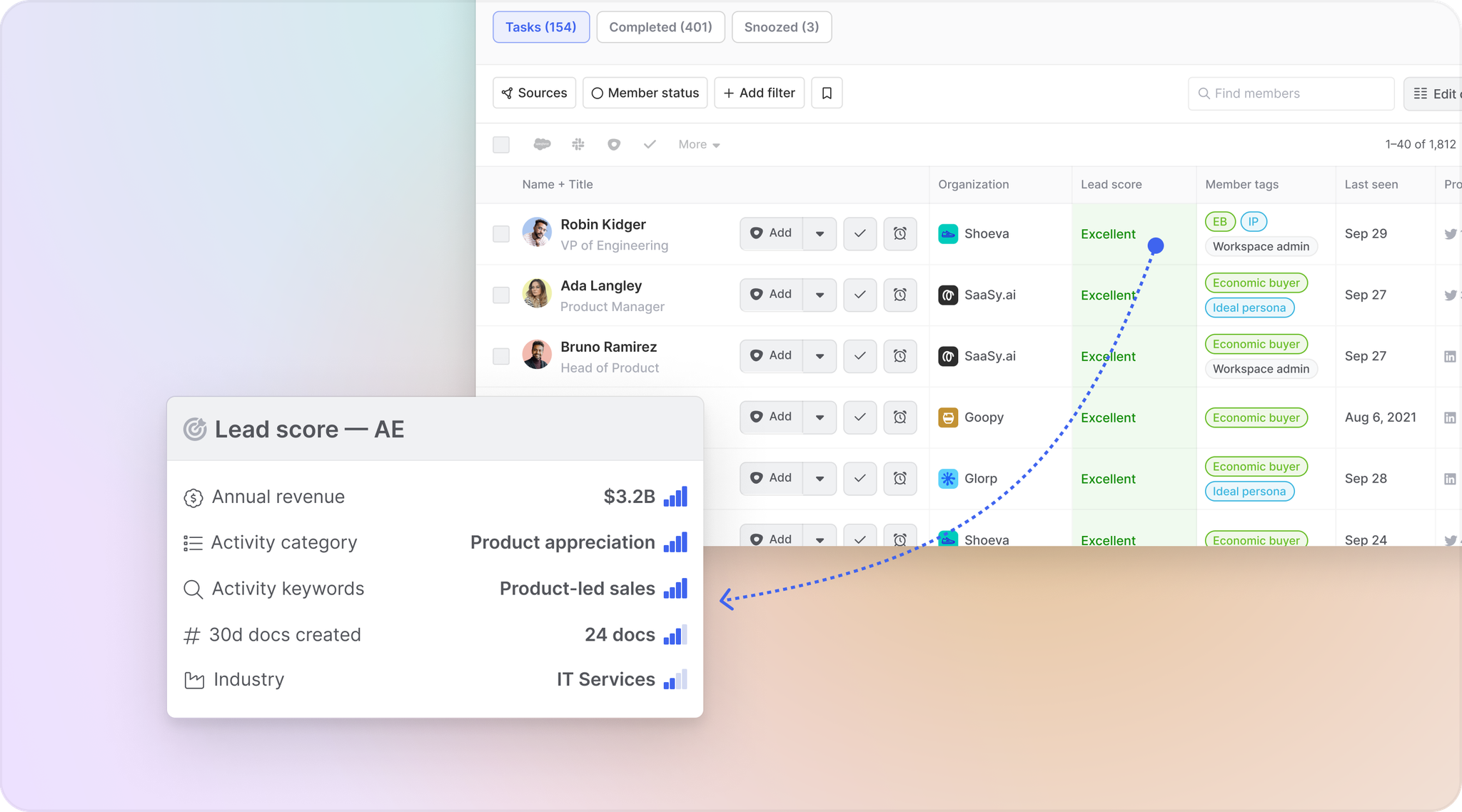
Common Room’s lead and account scoring feature allows you to instantly evaluate all opportunities based on customizable fit and behavior criteria. This makes it easy to find and follow up on the best opportunities fast using every available signal.
“Common Room shows all interactions that prospects had with Notion content across different channels,” said Felipe Fernandez, Enterprise BDR. “I managed to book two meetings in an hour with this strategy by simply calling the prospects and personalizing the pitch a little bit.”
Transform disparate data into context-rich profiles
Notion doesn’t just collect signals—it uses Common Room’s Person360™ identity and enrichment engine to transform disconnected data points into rich profiles for every person and account.
Common Room’s AI-powered identity resolution and enrichment automatically matches signals to real people and organizations. Reps can click into any individual or their company to see key behavioral, demographic, and firmographic details, including product usage, recent cross-channel activities, contact information, work histories, and much more.
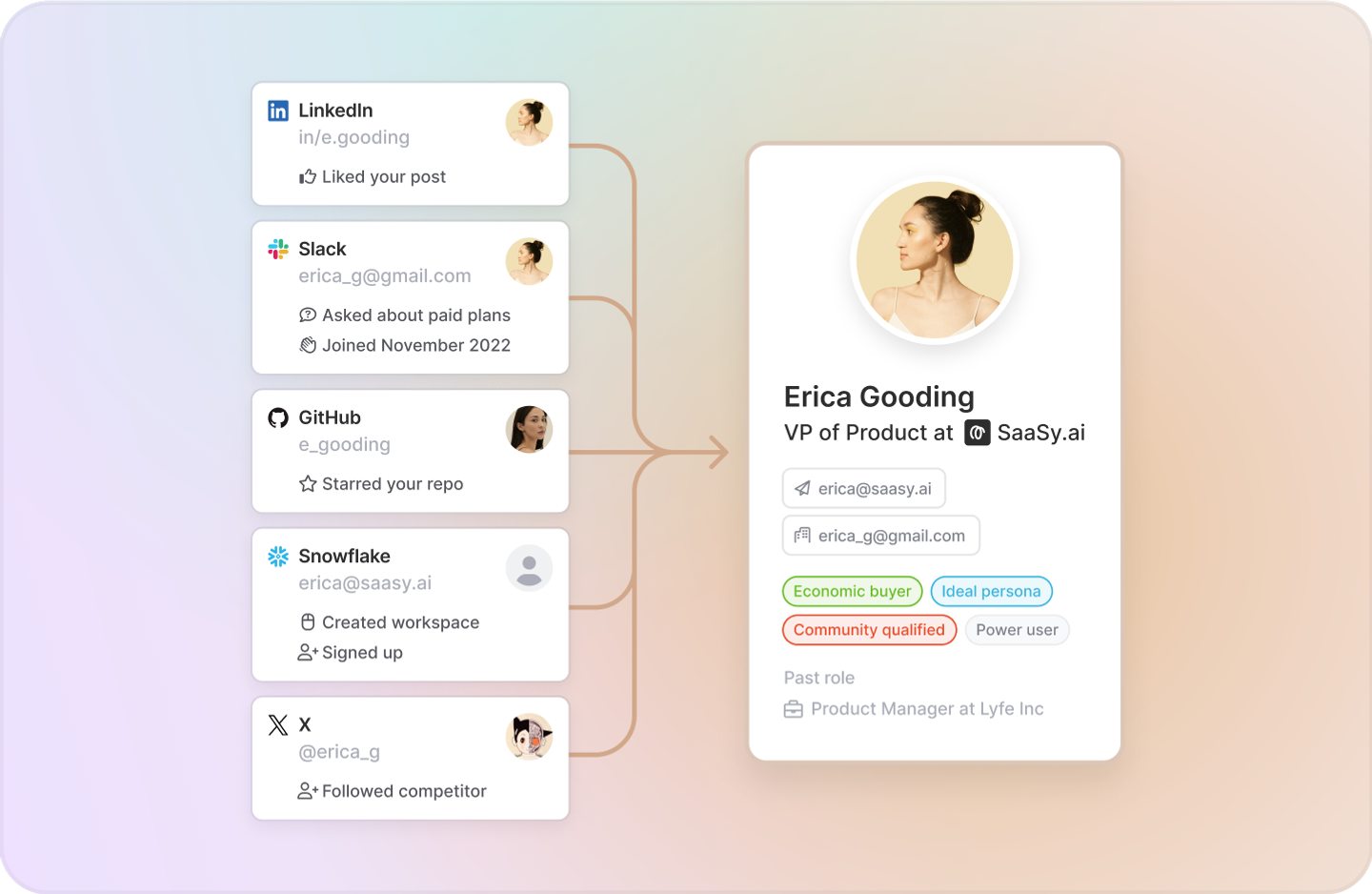
Common Room’s Person360 feature allows you to automatically collect, deanonymize, enrich, and match signals to a unified profile for individuals and organizations. This makes it easy to connect with the people and companies behind buying signals with full context.
This way, team members not only connect product activity to a real person and account, they also get full context for where people are in the customer journey.
“Common Room is the future of what connecting with your customers looks like,” said Monica Perez, Head of Customer Success. “My global CS team can instantly click into an account, view a complete profile of every user, and get total visibility into their behaviors across channels. This enables us to quickly build, execute, and iterate on scaled engagement plays that target the right people at the right time, all with a click of a button.”
Using custom product entities (in Notion’s case, Workspaces), Notion can dig even deeper into granular product activity directly from that person’s or account’s profile. This gives GTM teams full visibility into which contacts and organizations belong to which workspaces.
Custom product entitiesCommon Room’s custom product entities feature allows you to customize how product usage data is ingested so it’s always displayed in the way you want to see it. This makes it easy to tailor visibility into how users and accounts are behaving inside a product.
Notion’s GTM org can slice and dice the people and organizations tracked in Common Room based on any dimension using one-click filters, as well as use those filters to create custom tags that automatically surface product-qualified leads, economic buyers, high-fit orgs, and more.
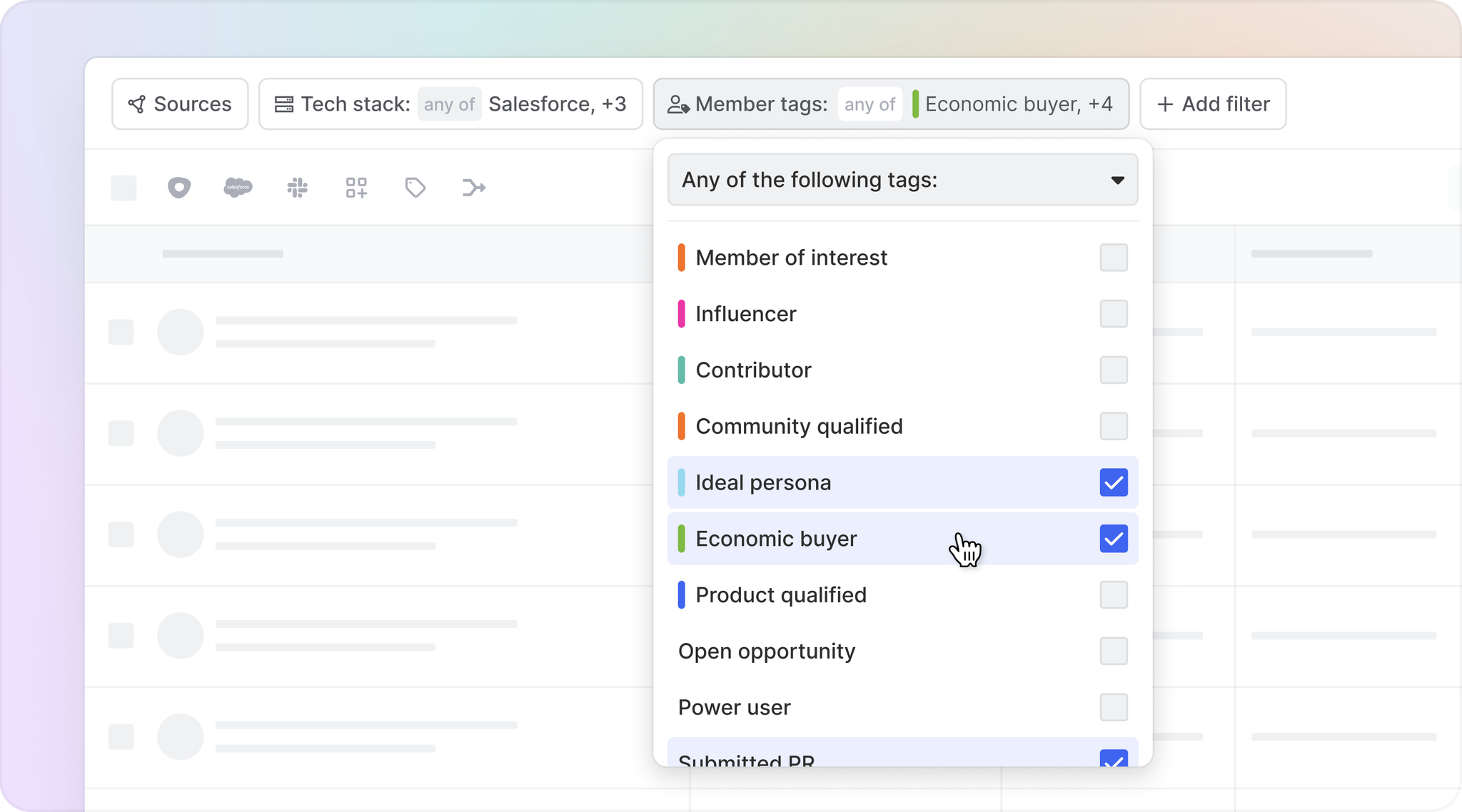
Common Room’s tags feature allows you to automatically label individuals and organizations with specific tags based on customizable criteria. This makes it easy to quickly filter for ideal personas, ideal customer profiles, and more.
Notion uses filters and tags to set up real-time alerts that notify different teams whenever prospect or customer activity they care about occurs.
For example, an AE focused on strategic accounts will instantly be alerted in Slack when someone in their book of business visits the pricing page on their website. Meanwhile, SDRs are updated in real time when a job change is detected among one of their leads.
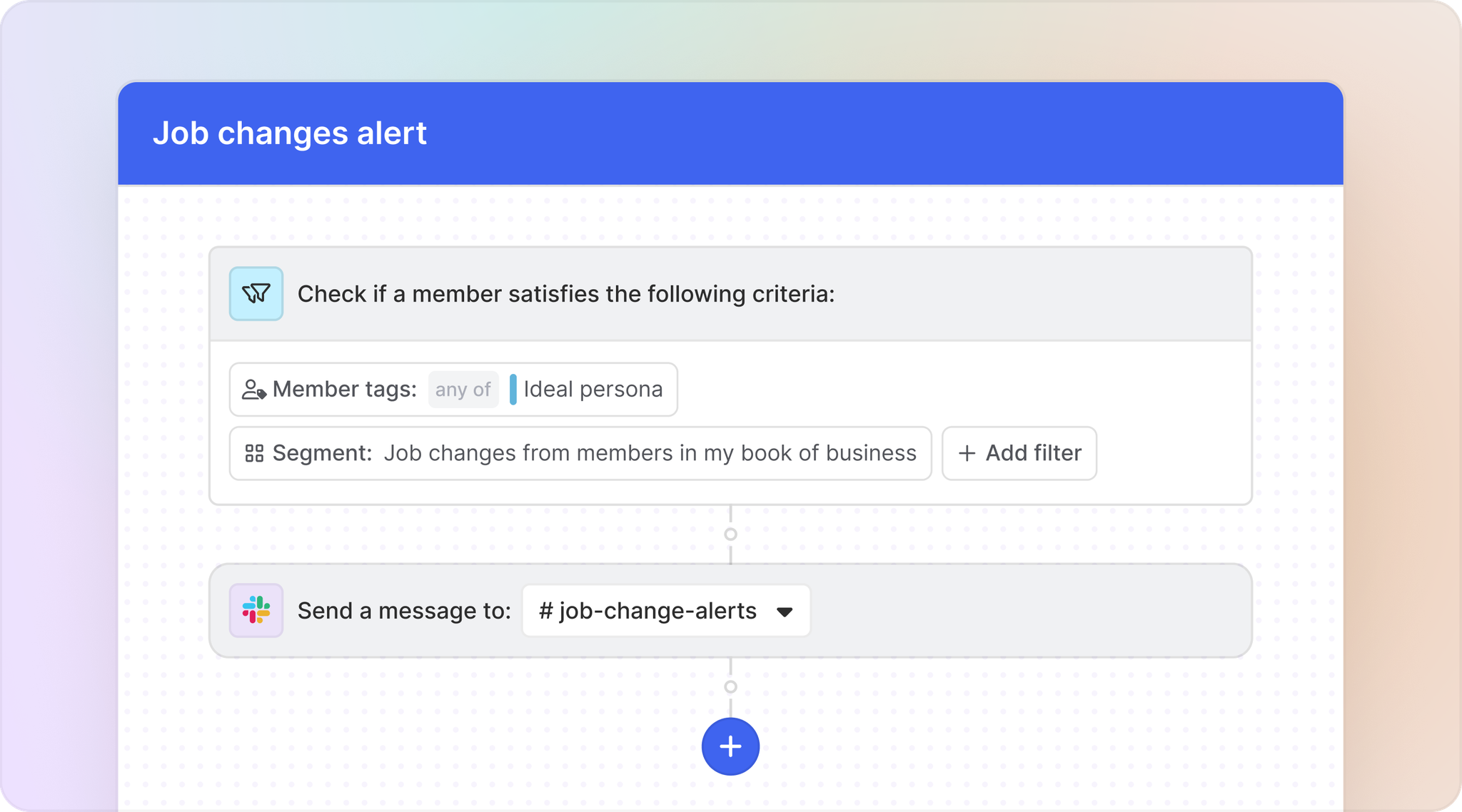
Common Room’s team alerts feature allows you to automate alerts based on any combination of triggers and filters so you can see real-time activity from the people and accounts you care about. This makes it easy to always stay updated on specific individuals and organizations.
Teams can also create fully automated workflows that allow them to action on these signals while they’re away. For instance, free trial sign-ups can be automatically added to personalized outbound sequences and heavy-duty product users can be tagged as power users with zero human touch based on granular, easy-to-build automations.
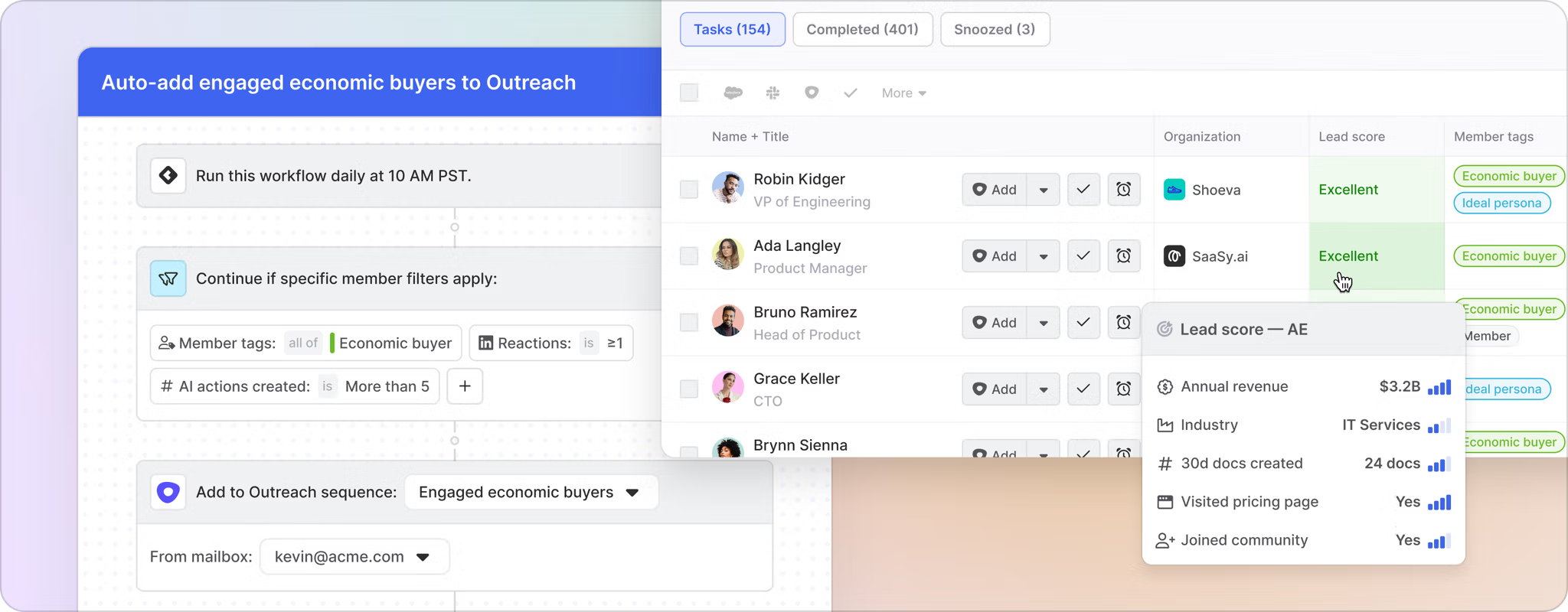
Common Room’s workflows feature allows you to create and customize automations based on specific demographic, firmographic, and activity details. This makes it easy to quickly and scalably track, organize, and engage people and accounts.
“The phrase that keeps coming up from reps is ‘game changer,’” said Aiden Blake, Head of Inside Sales, EMEA. “One of my SDRs says Common Room saves him 5x time, which is just huge for us.”
Automate winning plays across teams
One of the secrets to Notion’s success is its ability to quickly spin up, test, and templatize different plays using Common Room. This allows sales and success reps to rapidly find tactics that work and replicate them across their teams.
Using segments, Notion can automatically pull people and organizations into dynamic lists based on fully customizable criteria and use them to power different plays.
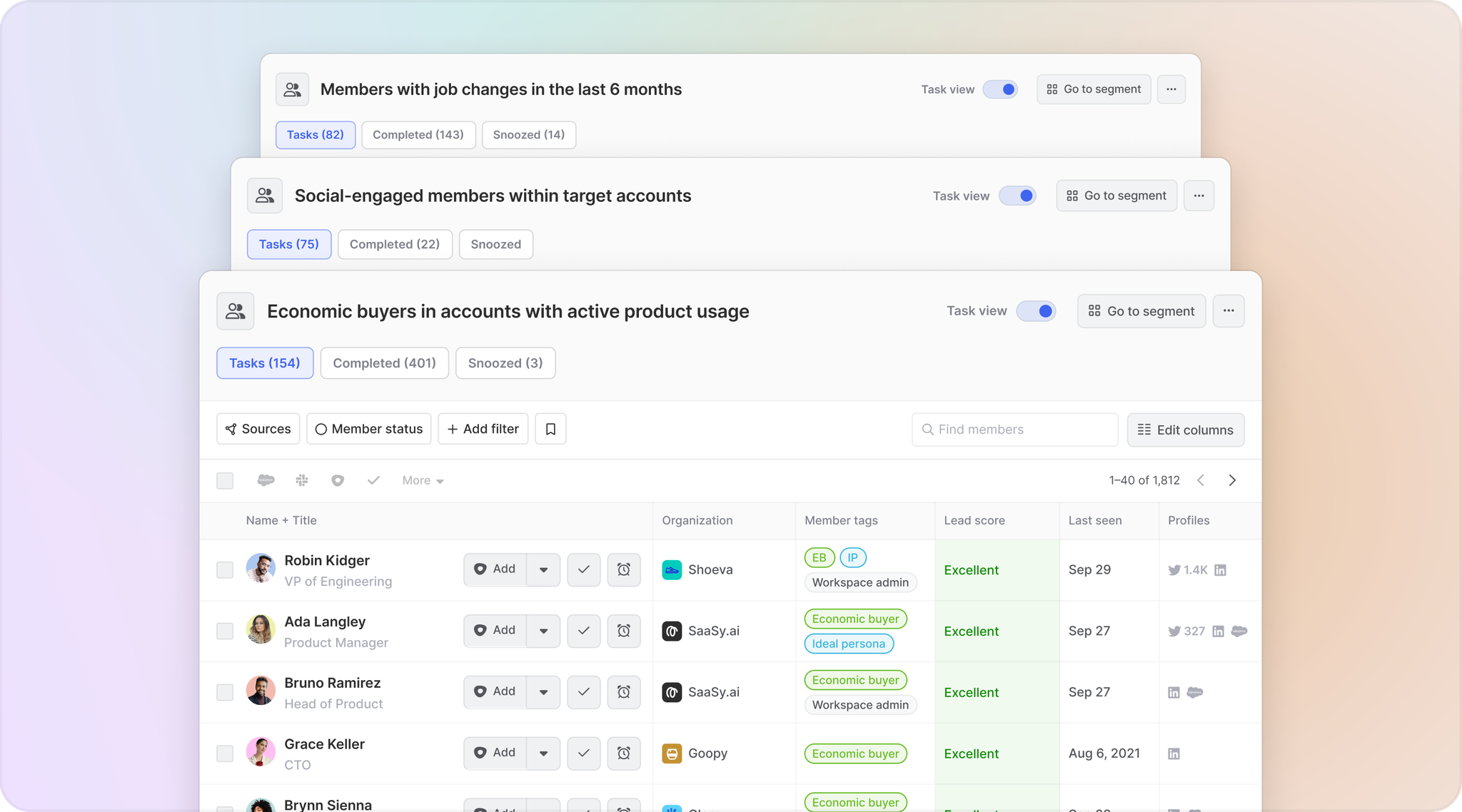
Common Room’s segments feature allows you to combine activity data from across 30-plus channels with customer fit criteria, such as organization size and role. This makes it easy to quickly surface, monitor, and engage specific people and companies at scale.
For example, people who demonstrate high buying intent, such as those who sign up for a free trial and visit Notion’s pricing page, are automatically added to a segment. At the same time, the CS team can act on those who indicate churn risk in a distinct segment for new users at accounts that haven’t adopted a certain number of features. Finally, even non-product users—such as economic buyers who recently changed jobs and used to work at a company that was a paying customer—are automatically highlighted in their own segment.
Team members can then use these segments as interactive burndown lists to take action on, such as adding contacts to a personalized Outreach sequence, visiting their LinkedIn profiles, sending them a direct message on Slack, or even syncing their records with Salesforce—all from the same place and with zero context switching.
This helps sales and CS alike quickly execute on plays, iterate as necessary, and templatize plays so they can be repeated at scale.
Results
The ability to rapidly increase speed to lead—as well as take action on opportunities with full context—has helped Notion achieve a 30% increase in the number of meetings booked per rep per month in fewer than 5 months.
But the results have been felt across all of GTM, including SDRs, BDRs, AEs, AMs, CS, RevOps, and beyond.
From December 2023 to April 2024, Common Room directly contributed to:
- 16% of total pipeline
- 18% of total revenue
“The results speak for themselves,” said Chief Revenue Officer Erica Anderson. “Common Room helps us reach the right people with the right message at the right time—faster and easier. We’re excited to keep building plays around all the signals now at our fingertips.”
Notion gives people a single space to think, write, and plan. Common Room gives Notion a single place to see every signal, get the full context behind it, and act on it fast.
Turn customer data into customer intelligence with Common Room
Get started for free or get in touch to see how Common Room can help you go to market intelligently, from sales to success and beyond.
We think you'd like these

Semgrep on turning hidden signals into pipeline [video]
2.5x ROI in 2 months
See how Semgrep used Common Room to 2.5x ROI in two months and increase pipeline by 74% quarter over quarter.Read full storyHow Weaviate built a go-to-market command center to 3x pipeline generation
3x more pipeline
See how Weaviate used Common Room to triple pipeline generation.Read full storyHow Anyscale stack ranked its entire buyer universe to 2x pipeline quarter over quarter
2x more pipeline QoQ
See how Anyscale used Common Room to double pipeline quarter over quarter.Read full storyHow Workvivo systematized rep success to increase meetings booked by 40%
40% more meetings in 1 month
See how Workvivo used Common Room to generate 40% more meetings booked in just one month.Read full storyHow Vivun leaned into GTM AI to boost pipeline by 40% with 50% fewer SDRs
40% more pipe with 50% fewer SDRs
See how Vivun used Common Room to generate 40% more pipeline with 50% fewer SDRs.Read full storyHow Semgrep warmed up cold outbound to grow pipeline 74% in a single quarter
74% more pipeline in 1 quarter
See how Semgrep used Common Room to increase qualified pipeline by 74% in a single quarter.Read full story
